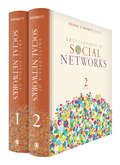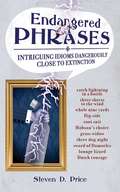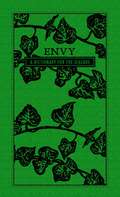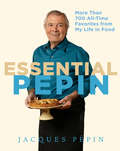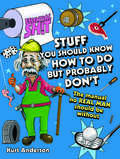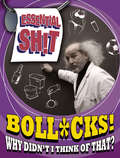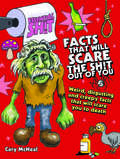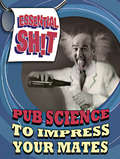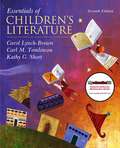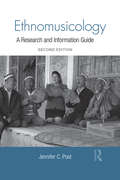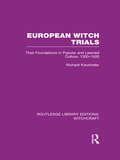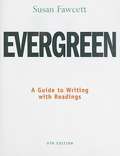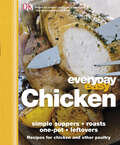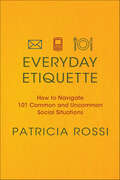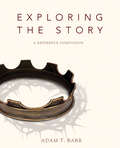- Table View
- List View
Encyclopedia of Global Justice
by Deen K. ChatterjeeThis two-volume Encyclopedia of Global Justice, published by Springer, along with Springer's book series, Studies in Global Justice, is a major publication venture toward a comprehensive coverage of this timely topic. The Encyclopedia is an international, interdisciplinary, and collaborative project, spanning all the relevant areas of scholarship related to issues of global justice, and edited and advised by leading scholars from around the world. The wide-ranging entries present the latest ideas on this complex subject by authors who are at the cutting edge of inquiry. The Encyclopedia sets the tone and direction of this increasingly important area of scholarship for years to come. The entries number around 500 and consist of essays of 300 to 5000 words. The inclusion and length of entries are based on their significance to the topic of global justice, regardless of their importance in other areas.
Encyclopedia of Islamic Civilization and Religion
by Ian Richard NettonThe Encyclopedia of Islamic Civilization and Religion provides scholarly coverage of the religion, culture and history of the Islamic world, at a time when that world is undergoing considerable change and is a focus of international study and debate. The non-Muslim world's perceptions of Islam have often tended to be dominated by unrepresentative radical extremist movements and media interpretations of events involving such movements, to the extent that many people are unaware of the depth and variety of Islamic thought. At the same time, many who have had a formal training in Islamic studies have tended to concentrate on the traditional, to the exclusion of the contemporary. The Encyclopedia of Islamic Civilization and Religion covers the full range of Islamic thought, in historical depth, but it also provides substantial coverage of contemporary trends across the Muslim world. With well over a thousand entries on Islamic theology, history, arts, science, law and institutions, and coverage of Islam in individual countries and cities around the world, the Encyclopedia of Islamic Civilization and Religion provides an extremely rich resource for students and researchers in religious studies and Middle Eastern studies. Entries are cross-referenced and bibliographies are provided. There is a full index. Routledge published The Qura'n: An Encyclopedia in 2005, an excellent companion to the Encyclopedia of Islamic Civilization and Religion.
Encyclopedia of Social Networks
by Dr George A. BarnettRequest a FREE 30-day online trial to this title at www.sagepub.com/freetrialThis two-volume encyclopedia provides a thorough introduction to the wide-ranging, fast-developing field of social networking, a much-needed resource at a time when new social networks or "communities" seem to spring up on the internet every day. Social networks, or groupings of individuals tied by one or more specific types of interests or interdependencies ranging from likes and dislikes, or disease transmission to the "old boy" network or overlapping circles of friends, have been in existence for longer than services such as Facebook or YouTube; analysis of these networks emphasizes the relationships within the network . This reference resource offers comprehensive coverage of the theory and research within the social sciences that has sprung from the analysis of such groupings, with accompanying definitions, measures, and research.Featuring approximately 350 signed entries, along with approximately 40 media clips, organized alphabetically and offering cross-references and suggestions for further readings, this encyclopedia opens with a thematic Reader's Guide in the front that groups related entries by topics. A Chronology offers the reader historical perspective on the study of social networks. This two-volume reference work is a must-have resource for libraries serving researchers interested in the various fields related to social networks.
Endangered Phrases: Intriguing Idioms Dangerously Close to Extinction
by Steven D. Price"Person to person" (and "station to station"), "bar sinister," "the weed of crime bears bitter fruit," "between the devil and the deep blue sea," "will o' the wisp," "poor as Job's turkey" . . . these are just a few phrases that were once part of everyday speech. However, due to our evolving language and other cultural changes, there are hundreds of phrases poised on the brink of extinction. Can such endangered phrases be saved? And if so, why? These are questions Steven D. Price, award-winning author and keen observer of the passing linguistic scene, answers in this challenging and captivating compilation. It is sure to increase your appreciation of the English language's ebb and flow-and enhance your own vocabulary along the way.
Envision In Depth: Reading, Writing, and Researching Arguments
by Christine Alfano Alyssa O'BrienEnvision in Depth: Reading, Writing, and Researching Arguments 2/e, is a combined rhetoric and reader intended for composition courses focusing on argumentation and research-based writing. Taking contemporary culture as its central theme and context, Envision in Depth is concerned with the fundamentals of analyzing and writing powerful, effective arguments. Students using Envision in Depth will learn how to analyze and compose arguments, design and conduct research projects, and produce persuasive visual and oral presentations in response to over 100 contemporary arguments in a wide range of verbal and visual genres.
Envy
by Adams MediaThe Seven Deadly Sins have sliced up the dictionary and taken what's theirs. No one vice is too greedy as each volume prides itself on having more than 500 entries. Word lovers will lust after these richly packaged volumes--and once you've collected all seven, you'll be the envy of all your friends.Envy: A Dictionary for the JealousEveryone else will be turning green when the Envious reveal their desirable new vocabularies. From A to Z, each entry feeds the monster and makes it want that much more.
Envy: A Dictionary for the Jealous
by Media AdamsThe Seven Deadly Sins have sliced up the dictionary and taken what's theirs. No one vice is too greedy as each volume prides itself on having more than 500 entries. Word lovers will lust after these richly packaged volumes--and once you've collected all seven, you'll be the envy of all your friends.Envy: A Dictionary for the JealousEveryone else will be turning green when the Envious reveal their desirable new vocabularies. From A to Z, each entry feeds the monster and makes it want that much more.
Essays and Dissertations Made Easy: Flash
by Hazel HutchisonThe books in this bite-sized new series contain no complicated techniques or tricky materials, making them ideal for the busy, the time-pressured or the merely curious. Essays and Dissertations Made Easy is a short, simple and to-the-point guide to applied psychology. In just 96 pages, the reader will learn all about why we do the things we do. Ideal for the busy, the time-pressured or the merely curious, Essays and Dissertations Made Easy is a quick, no-effort way to break into this fascinating topic.
Essays and Dissertations Made Easy: Flash
by Hazel HutchisonThe books in this bite-sized new series contain no complicated techniques or tricky materials, making them ideal for the busy, the time-pressured or the merely curious. Essays and Dissertations Made Easy is a short, simple and to-the-point guide to applied psychology. In just 96 pages, the reader will learn all about why we do the things we do. Ideal for the busy, the time-pressured or the merely curious, Essays and Dissertations Made Easy is a quick, no-effort way to break into this fascinating topic.
Essential Pepin
by Jacques PépinFor the first time ever, the legendary chef collects and updates the best recipes from his six-decade career. With a searchable DVD demonstrating every technique a cook will ever need.In his more than sixty years as a chef, Jacques Pépin has earned a reputation as a champion of simplicity. His recipes are classics. They find the shortest, surest route to flavor, avoiding complicated techniques.Now, in a book that celebrates his life in food, the world's most famous cooking teacher winnows his favorite recipes from the thousands he has created, streamlining them even further. They include Onion Soup Lyonnaise-Style, which Jacques enjoyed as a young chef while bar-crawling in Paris; Linguine with Clam Sauce and Vegetables, a frequent dinner chez Jacques; Grilled Chicken with Tarragon Butter, which he makes indoors in winter and outdoors in summer; Five-Peppercorn Steak, his spin on a bistro classic; Mémé's Apple Tart, which his mother made every day in her Lyon restaurant; and Warm Chocolate Fondue Soufflé, part cake, part pudding, part soufflé, and pure bliss.Essential Pépin spans the many styles of Jacques's cooking: homey country French, haute cuisine, fast food Jacques-style, and fresh contemporary American dishes. Many of the recipes are globally inspired, from Mexico, across Europe, or the Far East.In the accompanying searchable DVD, Jacques shines as a teacher, as he demonstrates all the techniques a cook needs to know. This truly is the essential Pépin.
Essential Shit - Stuff You Should Know How to Do, but Probably Don't (Essential Shit)
by Kurt AndersonBlokes don't know everything but fortunately this invaluable guide features every manly activity a real guy should be able to do. So sit back, crack open a cold one and let your education commence. From changing a flat tyre to chopping down a tree, operating a drill convincingly and even downing a shot without making a face...this manual has it all! This little gem is packed with hidden secrets and clever solutions. So read, learn and live it. You'll never have to ask for directions again.
Essential Shit: Bollocks! Why Didn't I Think of That? (Essential Shit)
by Randall PefferFrom the invention of the electric chair to the less offensive post-it note, "Bollocks! Why Didnt I Think of That?" features 101 clever inventions we could no longer imagine life without. Each ingenious invention comes complete with its history and handy trivia - I bet you you didn't know early Romans used porcupine quills as tooth-picks? Or that 1,000,000,000 Barbies have been sold worldwide? This must-have guide will allow you to impress your mates with your newfound fascinating knowledge of every invention from toilet paper to the Theory of Evolution. And it will have you slapping your head in no time, thinking "Bollocks! Why didn't I think of that?"
Essential Shit: Facts that will Scare the Shit Out of You (Essential Shit)
by Cary McnealDisturbing phenomena are everywhere we turn and this book is jam-packed with facts that will truly horrify you but undoubtedly entertain and educate at the same time. From the ugly truth about food and drink, to the human body exposed to the beastly tales of creatures that outnumber us - no subject is off limits. Did you know there is a sneaky fish that can swim up your genitals? Or that the average human loses 85,000 brain cells each day? If not, read on - there's plenty more where that came from.
Essential Shit: Pub Science to Impress Your Mates (Essential Shit)
by Randall PefferThis is science but not as you know it - here you get all the really cool stuff they didn't teach you in the classroom but you've always wanted to know...For example, ever wondered why hair grows out your nose and ears and if cockroaches really would survive a nuclear blast? Do you wish you could crush a beer can on your forehead or open a door with a credit card? Then look no further, all will be explained here. This is the ultimate science textbook and will answer all your craziest science questions with clarity, practical guidance and, of course, mirth. This is the perfect source of pub ammo.
Essentials Of Argument
by Nancy V. WoodThis concise argument text presents a broad range of rhetorical theory while providing the clear explanations and examples to make it accessible to an exceptionally wide range of students. Essentials of Argument, 3e, contains ten chapters, each accompanied by class exercises and writing assignments. Students using this text will learn to identify topics of personal and social consequence, to read and form opinions of their own, to analyze a potential audience, and to write persuasive argument papers. Research methods are introduced early, instructing students how to locate, print, and evaluate online materials and avoid plagiarism.
Essentials of Children's Literature (Seventh Edition)
by Carol Lynch-Brown Carl M. Tomlinson Kathy G. Short'Essentials of Children's Literature' is a brief, affordable, comprehensive textbook with rich resources-- a true compendium of information about children's literature. It is tailored to a survey course in children's literature but, by virtue of its brevity and affordability, is also suitable as a companion text in an integrated language arts course.
Ethnomusicology: A Research and Information Guide (Routledge Music Bibliographies)
by Jennifer PostFirst published in 2011. Routledge is an imprint of Taylor & Francis, an informa company.
European Witch Trials: Their Foundations in Popular and Learned Culture, 1300-1500 (Routledge Library Editions: Witchcraft)
by Richard KieckheferIn popular tradition witches were either practitioners of magic or people who were objectionable in some way, but for early European courts witches were heretics and worshippers of the Devil. This study concentrates on the period between 1300 and 1500 when ideas about witchcraft were being formed and witch-hunting was gathering momentum. It is concerned with distinguishing between the popular and learned ideas of witchcraft. The author has developed his own methodology for distinguishing popular from learned concepts, which provides adequate substantiation for the acceptance of some documents and the rejection of others. This distinction is followed by an analysis of the contents of folk tradition regarding witchcraft, the most basic feature of which is its emphasis on sorcery, including bodily harm, love magic, and weather magic, rather than diabolism. The author then shows how and why learned traditions became superimposed on popular notions – how people taken to court for sorcery were eventually convicted on the further charge of devil worship. The book ends with a description of the social context of witch accusations and witch trials.
Eva Scrivo on Beauty
by Gina Way Arik Efros Eva ScrivoEva Scrivo has worked with thousands of women over the years and knows firsthand that beauty is a learned skill that is within everyone's grasp. Approaching beauty as a whole and each person as an individual, Eva Scrivo on Beauty opens your eyes to a world of possibilities and provides the tools for attaining the looks and confidence you've always dreamed of. This is a definitive guide to gorgeous hair, glowing skin, beautiful makeup, a healthier body, more positive self-image, and a stronger fashion sense. By debunking common myths, simplifying professional techniques, translating industry terms, and sharing insights gained from years of experience, Eva Scrivo on Beauty not only teaches you the rules, it shows when to break them in order to create your own personal style. Consider this book and its author to be a beauty support system and lifestyle coach--a source of inspiration and a place to find both knowledge and encouragement. Eva Scrivo on Beauty gives you the virtual experience of sitting in Eva's chair at her salon and provides guidance on topics such as: Designing the right haircut for your features and lifestyle. Selecting hair color to complement your skin tone and add dimension to your cut. How to give yourself a salon-worthy blowout. Understanding what part of your beauty routine can be done at home and when to invest in the services of a skilled professional. Finding and effectively communicating with a good stylist. How the right eyebrow shape and color can change your entire face. Effective beauty routines for the morning, nighttime, and in between. Beauty foods that nourish your hair and skin. Overcoming the negative impact that stress has on your looks. Making smart fashion choices to pull it all together. And much more!
Eva Scrivo on Beauty: The Tools, Techniques, and Insider Knowledge Every
by Gina Way Arik Efros Eva ScrivoEva Scrivo has worked with thousands of women over the years and knows firsthand that beauty is a learned skill that is within everyone's grasp. Approaching beauty as a whole and each person as an individual, Eva Scrivo on Beauty opens your eyes to a world of possibilities and provides the tools for attaining the looks and confidence you've always dreamed of. This is a definitive guide to gorgeous hair, glowing skin, beautiful makeup, a healthier body, more positive self-image, and a stronger fashion sense. By debunking common myths, simplifying professional techniques, translating industry terms, and sharing insights gained from years of experience, Eva Scrivo on Beauty not only teaches you the rules, it shows when to break them in order to create your own personal style. Consider this book and its author to be a beauty support system and lifestyle coach--a source of inspiration and a place to find both knowledge and encouragement. Eva Scrivo on Beauty gives you the virtual experience of sitting in Eva's chair at her salon and provides guidance on topics such as: Designing the right haircut for your features and lifestyle. Selecting hair color to complement your skin tone and add dimension to your cut. How to give yourself a salon-worthy blowout. Understanding what part of your beauty routine can be done at home and when to invest in the services of a skilled professional. Finding and effectively communicating with a good stylist. How the right eyebrow shape and color can change your entire face. Effective beauty routines for the morning, nighttime, and in between. Beauty foods that nourish your hair and skin. Overcoming the negative impact that stress has on your looks. Making smart fashion choices to pull it all together. And much more!
Evergreen: A Guide to Writing with Reading (9th edition)
by Susan FawcettEVERGREEN combines carefully crafted instruction, high-interest readings and student models, and plentiful practice exercises, to provide the most effective paragraph-to-essay-level Developmental Writing text on the market. The Ninth Edition includes expanded and revised coverage of writing essays, including an additional essay chapter and numerous additional student models. Photos enhance high-interest readings and promote critical viewing as well as critical thinking and clear writing.
Everyday Easy Chicken: Simple Suppers, Roasts, One-Pot, Leftovers; Recipes for Chicken and Other Poultr
by DKThis wonderfully illustrated, delicious guide is the single-ingredient resource for each and every chicken lover. Easy to navigate, the six "recipe choosers" at the start of the book act as an instant reference for cooks in a hurry. A useful techniques section covers all the preparation methods you may need step-by-step. Become an expert poultry chef in record time with this complete, comprehensive cooking manual. Recipes aren&’t all this book has to offer. Everyday Easy Chicken is jam-packed with all the information busy home cooks need to know. Easily-recognizable icons with each recipe indicate serving proportions, preparation time, cooking time, and nutritional information for cooks looking to prepare low-fat and GI meals. This guide also details what special equipment may be required for each recipe and even offers tips on storing and freezability. Other handy extras include information on how to plan ahead for your meal, and expert tips on what to pair with your favorite poultry. Even if you don't have chicken all that often, Everyday Easy Chicken's easy, delicious results will make you wish you did!
Everyday Etiquette: How to Navigate 101 Common and Uncommon Social Situations
by Patricia RossiThe secret to self-confidence is to know and understand the rules of social engagement before you're in the middle of an uncomfortable situation.Do you know how to:Pick the right fork? Shine at a networking event? Write a Thank you Note? Shake hands? RSVP to an invitation? Say no to a request for a favor?Use social media with clarity?Behave at a sporting event?Say the perfect thing at a funeral?Smoke a cigar in public? Etiquette isn't just something you need on formal occasions. It's a blueprint for how to behave every day, in every situation, to make interactions between people smooth and pleasant, with no ruffled feathers, misunderstandings or hurt feelings. It helps you smoothly transition from college to corporate life, and from professional obligations to personal ones. Etiquette doesn't exist to add a layer of extra rules to life—it's there to guide us to treat each other with kindness and consideration in our personal and professional lives.
Exploring Medical Language: A Student-directed Approach (8th edition)
by Myrna Lafleur Brooks Danielle Lafleur BrooksMaster the medical terminology you'll need for success with this easy-to-use, objective-based approach! Focused on medical terminology and vocabulary, Exploring Medical Language: A Student-Directed Approach, 8th Edition helps you understand complex medical terms using a proven step-by-step strategy, building each term from its foundation. With a logical, body-systems organization and engaging terminology exercises throughout, it's your key to communicating confidently and effectively with other health care professionals. Systematic approach to terminology equips you to recognize and define new terms as you encounter them and to build the medical vocabulary you ll need in the health care setting. Pronunciation key provides quick access to frequently referenced material. Case studies encourage critical thinking and challenge you to apply what you ve learned to realistic scenarios. Complementary and Alternative Medicine boxes highlight words and phrases associated with this increasingly popular discipline. Terminology flash cards included with every book provide valuable review and self-assessment tools you can take anywhere for study on the go. Audio CDs, available at an additional charge and packaged either separately or with the book, help you perfect your pronunciation of difficult terms. Engaging study tools on a companion Evolve website reinforce your understanding through interactive exercises, the Body Spectrum A&P review program, and a 5,000-term English/Spanish glossary. Medical Terminology Online, available at an additional charge, gives you an enhanced learning experience with fully integrated online lessons, animations, slide shows, quizzes, exams, and more. Anatomy and physiology "boosters" on the companion Evolve website strengthen your understanding of important A&P concepts. Updated terms and abbreviations throughout the text keep you current with the latest advances in technology and changes in the health care industry. New illustrations clarify complex physiological processes and familiarize you with equipment you may encounter on the job.
Exploring the Story: A Reference Companion
by Adam BarrMany people today encounter strange events, names, customs and/or people when they pick up their Bible to read. The world of the Bible can seem very distant to modern readers, even if they are reading a contemporary translation. To help readers gain a better understanding of the world of the Bible, Zondervan has developed a one-volume, handy-size reference resource that will take readers from Genesis to Revelation and provide helpful insights along the way through the use of full-color photos, maps, charts, timelines, character descriptions, special articles on important biblical topics and background information about the nations, and places and customs that they will encounter in their reading of the Bible. What sets this reference resource apart from others is that it is designed to serve as a companion to The Story, a Bible that allows the events, poems, and teachings to the Bible to read like a novel. This reference resource is arranged according to the chapters as found in The Story with each section containing vital information for understanding the biblical text. The Story Reference Companion is a must-have reference volume for teachers and participants engaged in Bible study, especially those reading through The Story.


